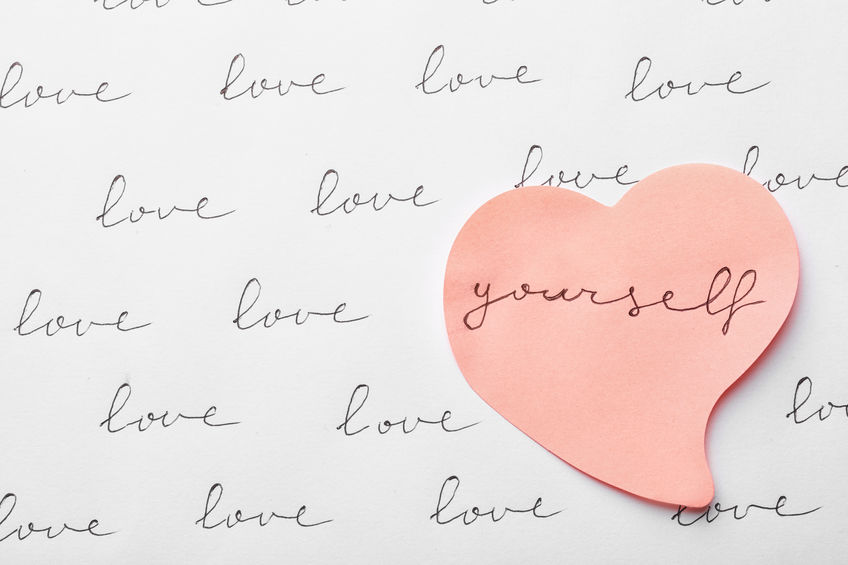
“Whatever you are doing, love yourself for doing it. Whatever you are feeling, love yourself for feeling it.” –Thaddeus Golas, 20th century author and philosopher
Are you a loving person? Are you kind, friendly, and encouraging? For most of us, the answer to these questions is yes—at least to some degree.
But here’s the true litmus test of unconditional love: Are you a loving person to yourself? Are you kind, friendly, and encouraging to yourself? Chances are it’s harder to answer yes to these questions.
Yet loving yourself is absolutely vital. Studies show it’s the basis for success, happiness, and healthy relationships. So how do you do it?
It’s easy to love yourself for your “good” qualities: your talents and successes. The trick is in learning to love your less-than-perfect qualities. The most direct way you can love the unlovable in yourself is to bring the feeling of love to whatever it is you’re feeling or experiencing – even it’s challenging or unpleasant. If you’re having a hard time loving yourself, begin by simply loving the fact that you are unable to love yourself in this moment.
Try this little experiment: Think of something that you really don’t like about yourself – you’re too fat or too thin, you can’t balance your checkbook, for example. Now close your eyes, and remember a time when you felt love in your heart for someone or something. Notice if you feel a warmth or expansion in the area of your heart. Now direct that same feeling of love toward yourself—just as you are, flaws and all.
Let’s be clear here, I’m not asking you to love your excess flab or your boniness or your lameness in the bean-counting department. What I’m suggesting is that you beam love, compassion, and understanding to that person who’s experiencing the challenge: you! When you do this, you’ll probably feel a physical shift in your body – you’ll be more relaxed and you may even find yourself smiling.
When you can love yourself in every situation—whether you’ve succeeded or failed, whether you feel good or bad, whether you’re enjoying life or hating it – you’ve taken self-love to the unconditional level.
This one small act can have big and measurable effects. A team of British researchers led by Dr. Paul Gilbert showed that training people to be loving and compassionate toward every aspect of themselves – even toward their tendency to be self-critical – significantly reduced mental suffering, depression, anxiety, self-criticism, shame, inferiority, and submissive behavior, while upping their ability to soothe and reassure themselves.
Hale Dwoskin, the bestselling author of The Sedona Method, and one of the 150 Love Luminaries I interviewed for my latest book, Love for No Reason, told me, “What most people call self-love – positive affirmations and putting smiley-face Post-its on the mirror – is just a manipulation. It’s like pasting a thin layer of positive emotion on top of problems. If you try to change them from a place of simply manipulating them, they only grow. But, if you love all your qualities as they are, good and so-called bad ones, you actually have the power to change them.”
When you connect to the unconditional love at your core—what I call Love for No Reason—real self-love starts to flow.
Every day, I do a very simple self-love practice that brings me into my heart and reminds me to treat myself with care. It comes in especially handy whenever I’m having a rough time or being critical toward myself or others. You can do this, too.
Throughout the day, ask yourself, What’s the most loving thing I can do for myself right now? or What’s the most loving way I can be with myself right now? And then pay very close attention to the answer.
Sometimes the answer is that you need to have more compassion for the part of you that is hurting; other times it’s forgiving yourself for your mistakes or lightening up on yourself. There are also times when the most loving thing you can do for yourself is taking a walk or a hot bath or calling a good friend for a chat. The important thing is to make the questions a part of your daily practice. Don’t think you’re being selfish—far from it! When you love and take care of yourself, you’ll find it inevitably serves everyone. And isn’t a world filled with love the kind we all want to live in?
(C) 2010. Marci Shimoff. Adapted from Love for No Reason: 7 Steps to Creating a Life of Unconditional Love (Free Press, December 2010). Love for No Reason offers a breakthrough approach to experiencing a lasting state of unconditional love—the kind of love that doesn’t depend on another person, situation, or romantic partner, and that you can access at any time and in any circumstance. This is the key to lasting joy and fulfillment in life. To order Love for No Reason, go to www.TheLoveBook.com and follow Marci on Twitter @Marci_Shimoff.



